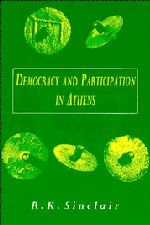Book contents
- Frontmatter
- Contents
- Preface
- Maps
- 1 The Athenian polis and the evolution of democracy
- 2 The privileges and the opportunities of the citizen
- 3 The responsibilities of the citizen
- 4 The sovereignty of the Demos, officials and the Council
- 5 Citizens and participation
- 6 The hazards of leadership
- 7 The rewards of leadership
- 8 The critics of Athenian democracy
- Appendix 1 The population of Athens
- Appendix 2 ‘Working days’
- Appendix 3 Notes on three constitutional matters
- Bibliography
- Index
6 - The hazards of leadership
Published online by Cambridge University Press: 01 June 2011
- Frontmatter
- Contents
- Preface
- Maps
- 1 The Athenian polis and the evolution of democracy
- 2 The privileges and the opportunities of the citizen
- 3 The responsibilities of the citizen
- 4 The sovereignty of the Demos, officials and the Council
- 5 Citizens and participation
- 6 The hazards of leadership
- 7 The rewards of leadership
- 8 The critics of Athenian democracy
- Appendix 1 The population of Athens
- Appendix 2 ‘Working days’
- Appendix 3 Notes on three constitutional matters
- Bibliography
- Index
Summary
The role of individuals
The functioning of the Athenian democracy depended on the support of large numbers of citizens willing to attend meetings of the assembly and to act as jurors. The space on the Pnyx could not, however, accommodate anything like the whole citizen body, and though the composition of the Ekklesia was not constant, there were undoubtedly not a few who, being unable or unwilling, rarely or never entered the assembly – or the courts. The effective functioning of the Athenian polis depended also on the interest of citizens who were not simply content with listening and voting in the Ekklesia and the Dikasteria. These citizens could undertake one of the large number of offices of state which were determined by use of the Lot. Some experience would be gained in those offices, and some honour especially in the arkhonships. But collegiality, annual tenure and the prohibition of a second term limited their power, while the use of the Lot deprived them of any real significance in terms of political standing.
The ambitious individual would seek rather to gain experience in the Boule or to be elected as a member of an embassy dispatched on a particular mission or as a member of a special committee appointed to investigate a specific matter. Or he would seek one of the elected offices – in particular, to be elected as a strategos or (in the mid-fourth century) as a Festival Fund Commissioner.
- Type
- Chapter
- Information
- Democracy and Participation in Athens , pp. 136 - 162Publisher: Cambridge University PressPrint publication year: 1988
- 1
- Cited by

